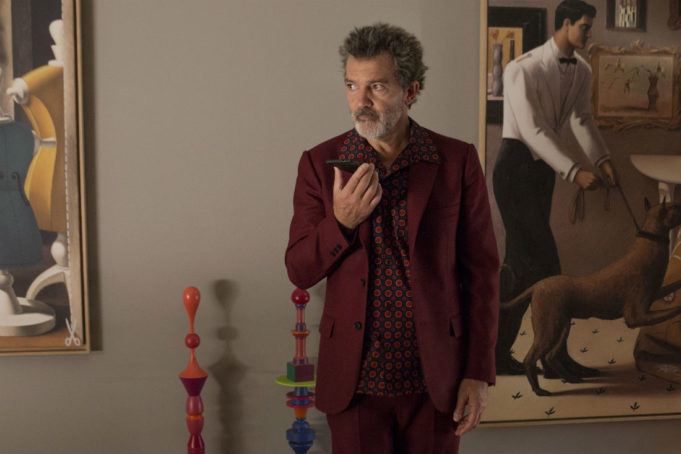Movies are usually worse or better than their hype. It’s a truly rare occasion when a movie turns out exactly as good as its hype, but such is the case with Pain and Glory. Pedro Almodóvar’s film has been making the rounds of the festival circuit, and at Cannes, Toronto, and New York, they’ve all said that this is a late-career masterpiece. I saw it at the Modern Cinema festival three weeks ago, and yeah, that’s exactly what it is. It’s not much fun for me as a critic to explain that a movie is what it’s advertised to be, but Almodóvar at his best is ample compensation, which you can see now at the AMC Grapevine Mills and the Grand Berry Theatre on the 22nd.
Antonio Banderas plays Salvador Mallo, an extremely Almodóvar-like Spanish filmmaker who is famous the world over. He has stopped working, however, because while he may not be old chronologically, he has an old man’s litany of aches and pains, including but not limited to crippling migraines, haunting insomnia, and a tendency to choke even on liquids. His body can’t take the strain of directing a film, and while people tell him to write, he doesn’t want to write anything that he can’t shoot. He’s so desperate to alleviate his pain that he dabbles in heroin.
While he’s high or receiving various medical treatments, he flashes back to his childhood, when young Salvador (Asier Flores) is raised by his mother (Penélope Cruz) in the caves outside Valencia and tries to sort through his feelings when he sees a handsome young laborer (César Vicente) naked. The theme of the past bleeding into the present is a theme Almodóvar has addressed repeatedly, in Bad Education and Broken Embraces especially. Less familiar is the director’s use of shiny computer graphics to illustrate Salvador’s various ailments. When Salvador anonymously pens a stage monologue for an estranged actor friend named Alberto (Asier Etxeandia) based on Salvador’s agonizing breakup with an Argentinian boyfriend who was addicted to heroin, the boyfriend (Leonardo Sbaraglia) happens to be at the theatrical performance. He’s inspired to meet with Salvador for the first time in decades, and the scene between the two men is reminiscent of Moonlight in its unspoken longing and poignancy.
All this is presented in candy colors by Almodóvar’s longtime cinematographer José Luis Alcaine, with even a scene in a doctor’s office taking place in front of a wall-sized photo of a synapse. We know the visuals in an Almodóvar film will be delicious, but here they’re matched by his script’s character insights, including a tensely funny bit when Salvador re-alienates Alberto during a Q&A session about an old film they made together. (“I feel his performance has gained a lot in stature over the years.” How’s that for a backhanded compliment to an actor?) Then there’s the scene when Salva’s mother first joins the community of people in the city of Paterna who make their homes in caves. She’s humiliated by not having a house, while the boy runs around the cave and thinks it’s the coolest thing.
Perhaps this movie’s greatest accomplishment is reminding us what a great actor Banderas is. He has appeared in so much Hollywood junk over the years that we forget what kind of range he had when he acted for Almodóvar in the 1980s (before he and the director quarreled, much like Salvador and Alberto do here). In this role, we see the shrinking of a man whose health problems have forced him to hole up in his house in Madrid with his artworks and books, as well as the shame of someone who is surrounded by recovering heroin addicts and can’t tell them that he’s now on the stuff himself. Salvador seems at his most vulnerable in a late scene with his aged mother (Julieta Serrano) shortly before her death, when she gently complains about living with him in Madrid and he tells her sincerely, “I’m sorry I wasn’t the son you wanted.”
Like some of Almodóvar’s other works, this is a film about the filmmaking process, as Salvador eventually recovers his health to make a movie about a subject he has never addressed, his childhood. Oddly enough, this makes Pain and Glory kin to Nine, the 2009 film musical about a creatively blocked film director. (Banderas starred in the stage version of that show before it was filmed, and Cruz got an Oscar nomination for being in it.) However, it’s a much greater achievement, with Almodóvar applying craftsmanship and rigor to his trademark flamboyance. The movie ends with a delightful shot that reveals Cruz to not be playing Salvador’s mother but an actress (herself, maybe?) portraying him in Salvador’s new film. The click that comes with that is the snapping of an intricate puzzle’s final piece, one with moving power.
Starring Antonio Banderas and Penélope Cruz. Written and directed by Pedro Almodóvar. Rated R.












